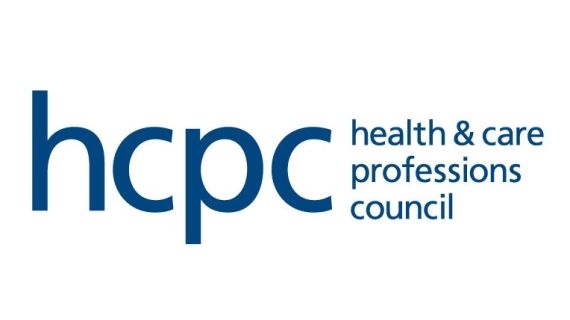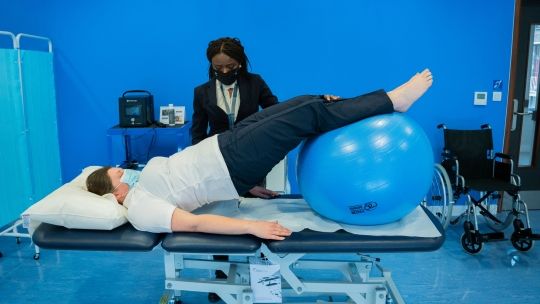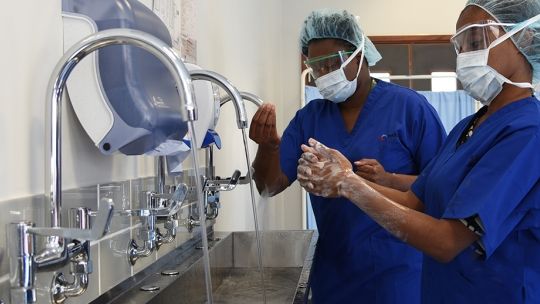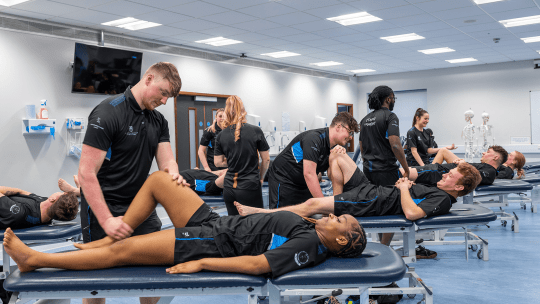
BSc (Hons) Occupational Therapy
- Study Mode: Full Time
- Location: High Wycombe
- Duration: Three Years
- Start Date: September 2024
You can also study this course:
If you’re an aspiring occupational therapist and want to make a promising start to your career, Buckinghamshire New University (BNU) has all the tools you need to start out strong and graduate ready to work.
As an occupational therapist, you will help people overcome difficulties carrying out day-to-day activities. It is a fulfilling role and a great way to give back to the community, and that’s why our inspirational work placements are close to home in Buckinghamshire, Berkshire and Oxfordshire. With insightful teaching, amazing facilities and a friendly student community, there is no limit to where you can go with BNU.*
*Pending RCOT accreditation.
Why study this subject?
Accidents, illness, disability, mental health issues and ageing affect millions of people making it harder for them to do everyday things, along with activities they enjoy. As an occupational therapist, you will help a variety of people overcome all kinds of challenges, so they can live as fully and independently as possible.
You will support a range of people, including:
- babies, children, young and older people
- people with physical disabilities or learning disabilities
- people with physical or mental health illnesses or other long-term conditions
As an occupational therapist you will assess and create treatment programmes and suggest helpful changes to the person's environment, whether that be at home, work or school, or elsewhere. You will make suggestions on how to use certain equipment which will help your patients with daily activities. It is a role where no day is the same and requires a caring and creative individual to work with people to come up with solutions and support their patients.
This course is accredited by the Health and Care Professions Council (HCPC).

Why study at Buckinghamshire New University?
Developed from professional insight and working experience, the programme has been developed in partnership with local employers to give you the most modern up to date skills required for the NHS and private practice. Our course will help you gain the skills you need to provide first class care.
BNU provides clinical placements within Buckinghamshire, Oxfordshire, Berkshire and London areas. Our course will put you in good stead to pursue work locally at our Trusts and other organisations after graduation, should you wish to remain here. We work with a range of partners across the region and our students are highly respected while there.
As a BNU student, you will automatically become a member of Bucks Students’ Union giving you access to a wide range of services that we offer for free as part of our exclusive Big Deal package. We are the only university in the UK to offer our members free access to such a diverse and exciting range of activities, allowing you to experience new things, socialise with broader groups of people and boost employability – all to enrich your university experience.
We utilise state-of-the-art facilities for learning, development and practicing of skills – our purpose-built wards include real equipment, just like you would find in a real life clinical setting. Simulation Based Education is an important aspect of all our healthcare programmes. You will regularly be taking part in realistic scenarios to practise a broad spectrum of technical skills in a safe and supportive environment.


What facilities can I use?
With industry standard facilities in the Buckinghamshire area, we are the only institution that can offer our level of equipment in High Wycombe and the immediate surrounding area.
At our High Wycombe Campus, we have purpose-built facilities, including well-equipped simulation clinics and teaching rooms, where you will be taught throughout your course. Our library is packed with all the information you need for your assessments, and there is plenty of room to knuckle down for some quiet study.
Most of the placements on your course are in Buckinghamshire and surrounding counties, in addition, due to the University being part of the PMP, we have existing placement contracts with various hospitals around London, Oxford, Berkshire and Hertfordshire.
We will also sign you up to our Virtual Learning Environment, which means you will have access to lots of online resources wherever you are!


What will I study?
Occupational therapy involves enhancing the daily lives of people with a broad range of physical, mental health and social needs. As an occupational therapist you will work with people of all ages, to improve their wellbeing and quality of life.
Our occupational therapy degree will equip you with the skills to practise as a competent occupational therapist, in a wide variety of health and social care environments. Your studies will cover the theory and the practical aspects of this exciting and varied role.
Working with a range of people who all have different requirements, you will need to understand each client's lifestyle so that you can work with them to create the best treatment plan. We help you take an individual approach to each patient's physical and mental wellbeing and evaluate all their needs - physical, social, psychological and environmental.
You will have the skills to be able to assess, plan, implement and evaluate treatment plans in hospital and community settings and establish realistic goals with the patient, or know when to refer patients to other specialists when needed.
Organising support and rehabilitation groups for carers and clients will be a big part of your role, you will be able to contribute to the analysis, planning, audit, development and evaluation of clinical services, using the skills you gain whilst studying at BNU.
How will I be taught and assessed?
All our degree modules will include online activities and we will engage in positive and formative feedback on your work. Forms of formative feedback include peer feedback, discussions, and in-class (face-to-face) interactions. Feedback from exams will be provided within the 3-week turnaround as per the University guideline for feedback.
The following assessment activities are used on this programme:
- viva exams with a focus on the evaluation and application of theoretical knowledge
- practical exams (OSCE) with a focus on skills and theory
- written exams
- written coursework with a focus on critical evaluation and analytical writing
- online portfolios with a focus on critical analysis, reflective practice, and professional development
- clinical case studies
- research literacies are assessed sequentially in the first-year research methods module and the final dissertation module.
Clinical Placement
You will also be continuously assessed on clinical placement in a range of different areas, such as physical and mental health settings. Practice is a key part of occupational therapy training.
Clinical placement is an important part of the occupational therapy course, however, being assessed is not something to fear. BNU wants the best outcome for you and we will always provide you an opportunity to improve, learn and grow.
What are the course entry requirements?
A typical offer will require a UCAS tariff score of: 120 - 144
UCAS points can be obtained through qualifications such as A levels, T levels, BTEC or an Access to Higher Education course in a relevant subject. Please list all your qualifications on the application form as you will be asked to provide copies when we receive your application.
The University’s general entry requirements will apply to admission to this course. Meeting one or more of the following requirements are acceptable methods of entry to the course:
- Five GCSEs or equivalent at grade 4 (C) or above, including English language or literature, mathematics, and a science subject in addition to the 120 UCAS tariff points listed below.
- 120 UCAS tariff points (e.g. 3 A Levels at grades BBB or above) or a BTEC Level 3 extended diploma in a science or health-related subject equivalent to 120 UCAS tariff points. You will also require the GCSE grades listed above.
- Foundation degree
- International Baccalaureate (30 points)
- Access to Higher Education course in Science, Health, Social Care or similar (60 credits, of which 45 credits will be at Level 3, including 30 at distinction grade and 30 at merit grade).
- We generally require experience relating to occupational therapy such as shadowing, work experience, access to virtual placements or healthcare experience in addition to one of the requirements above, However each application is considered on an individual basis.
- For learners, whose first language is not English, there is a requirement to achieve an IELTS tariff of 7 with no individual component below 6.5. This is in line with the recommendations of the HCPC.
Applicants who do not fit the typical entry requirements will be considered on an individual basis. In this situation evidence of recent study (within 3 years) to A level standard (level 3) alongside a profile of relevant healthcare or social care experience will be advantageous.
Applicants with a previous degree will be considered on an individual basis.
English language
If you are an international student, you must have the following minimum International English Language Test Score (IELTS) results at the time of applying:
- 7.0 overall or equivalent
- 7.0 in the listening and reading
- 7.0 in the writing and speaking
English and Mathematics GCSE (grade A–C or 4-9) or equivalent.
For further details of our international English entry requirements, please visit our international pages.
Experience
Candidates are typically required to have practical experience relating to Physiotherapy, such as shadowing, work placement, or healthcare work experience, but if you have the required grades and strong desire to study we encourage you to apply. Each case is considered on an individual basis.
Occupational health checks
Our admissions team will send a medical questionnaire alongside an offer letter. The questionnaire would be completed by you and returned to the admissions team, who then forward all the forms to an external occupational health adviser who will contact you for further screening if needed.
Pre-clinical vaccination
You will need to show evidence of completed vaccination for Hepatitis B, BCG, Varicella, and Influenza, where applicable, before starting the programme's placement. These vaccinations can be received from most GP surgeries in England. There is up-to-date information on the NHS Choices on how to obtain these vaccinations.
A satisfactory occupational health assessment will be required by all applicants prior to acceptance on the course. If you fail the occupational health assessment you cannot gain entry onto the course.
DBS
Admission to the occupational therapy degree programme is subject to the Rehabilitation of Offenders Act (1994) section 4 (2) Exemption Order 1975 and DHSS HC 88 (9) guidelines regarding child protection and police checks. All applicants are required as a condition of acceptance to satisfactorily complete a criminal record disclaimer form and give their permission for us to obtain an enhanced police check with the Disclosure and Barring Screening Service (DBS). Each year after that, you are required to self-declare any police cautions or convictions before each practice education module.
The DBS in the United Kingdom does not currently conduct overseas criminal record checks. Therefore, International applicants, those without British Citizenship and British Citizens with a significant period of overseas residency require a criminal record check or certificate of good conduct from their home/overseas country prior to entry onto the course. International applicants need to obtain a recent criminal record certificate from their home country and ensure that this is still valid by the date of enrolment in addition to the DBS requirements detailed above. A list of admissible certificates can be found on the UK Government website; https://www.gov.uk/government/publications/criminal-records-checks-for-overseas-applicants. Where an equivalent check is provided, applicants are required to complete an enhanced police check with the DBS a year later.
What are the tuition fees
Home
-
Home, Academic Year 2024 - 2025: £9,250 per year
International
-
Overseas/International, Academic Year 2024 - 2025: £15,150 per year
What are my career prospects?
When you graduate from BNU, you will be well equipped with the knowledge, values and professional skills you need for occupational therapy practice. You can be proud of the things you have achieved and look forward to pursuing a career in a subject you love.
We encourage you to seek employment in the placements you undertook while studying at BNU, and we encourage you to network and look for opportunities in the local area of Buckinghamshire, Berkshire and Oxfordshire. Our courses are developed in line with local employer’s skill shortages and needs for this purpose.
Registered occupational therapists work in a range of different areas including the NHS, local authorities, schools, independent organisations such as voluntary or community organisations, charities and other settings.
As a newly qualified occupational therapist, you may want to gain experience in a range of specialties before you decide on an area of occupational therapy you want to provide. You may already know where you want to go based on what you enjoyed and studied at university.
You can choose to specialise in areas of occupational therapy or take a more generalised approach. You don't have to remain in the same specialism throughout your career and can change your job role as you develop your experience and interests.
Pursuing promotion, or later down the line taking on consultation and specialist work is a way to increase your earnings and make an impact in the areas of occupation therapy that call to you the most. If you did decide to go down this route, it is highly advisable you have some experience and a degree, such as ours, to inform your knowledge.








